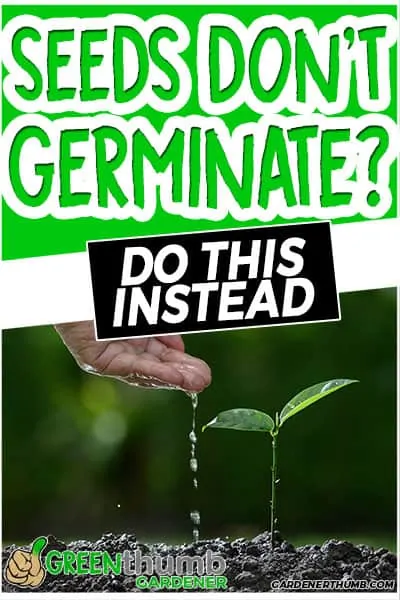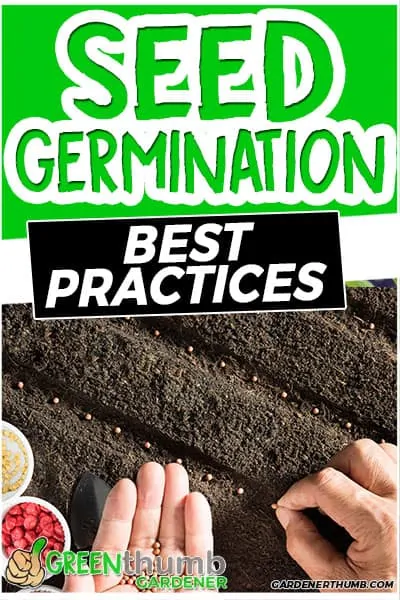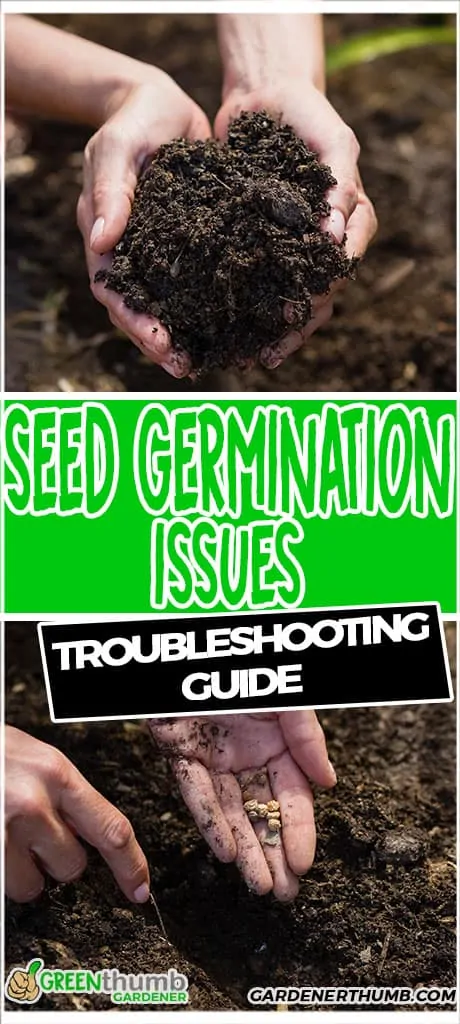What to Do If Seeds Don’t Germinate
Last updated: 9/21/20
With each new seed I plant, I find myself getting excited about the results. Unfortunately, there are times when these seeds don’t germinate.
So, I researched what to do if seeds don’t germinate. Here’s what I learned.
Depending on the cause of the problem, you’ll need to water or dry out your plant. You might also need to increase or lower your soil temperature while providing adequate oxygen.
Well, that’s not all. So, let’s dig in.
Green thumb Gardener occasionally links to product and/or services offered by vendors to assist you with all your gardening needs. Some of these may be affiliate links, meaning we earn a small commission if items are purchased.
Want to Download a Garden Hack Guide for FREE

Enter your email below and we will send you a guide to help you SAVE money in your garden.
4 Reasons Why Your Seeds Won’t Germinate
It can be quite exciting—all those expectations for your seeds. Then, weeks after the germination period, you can’t see a thing.
Well, the truth is that there’s something wrong somewhere. And this is why your seeds won’t germinate.
Here’s the thing. You will need to understand why your seeds aren’t growing before you can do anything about it.
So, here you go. Here are four reasons why your seeds might have trouble germinating.
1. Too Little or Too Much Water
One of the essential elements for seeds germination is water. However, this only works well when you have the right amount of water.
Your seeds usually dry out when they mature. As such, you’ll need to provide sufficient water to ensure they germinate. And if this water doesn’t come, such seeds won’t grow.
So, if you’re having problems with germination, you might want to check this out. You should confirm if your beddings aren’t too dry.
On the other hand, too much water can have a devastating effect on your seeds. Usually, this will cause poor and patchy germination. This is because there will be compaction and waterlogging.

Worse, your seeds may start to rot. So, you might want to check that your soil isn’t too damp. If it is, it might be a reason for your germination problems.
2. Absence of Adequate Oxygen
Just before photosynthesis sets in, oxygen is quite crucial for germination. And this is even connected to the water needs of your plants.
Your plants need to absorb enough oxygen before it can grow properly. And too much water can make it very difficult for oxygen to pass through.
Also, there’s the place of your planting depth when it comes to oxygen. Sometimes, you might have gone too deep. And, as such, your seeds can’t get oxygen.
So, just in case your germination problem continues, it might just be because of this. You might want to ensure you confirm from your seed packet the recommended depth when planting.
Also, keep your growing medium in mind. This is because choosing the wrong medium can mean low oxygen for your plants.
3. Low or High Temperatures
One other thing your seeds need when growing is the right temperature. And this is because the temperature affects growth rates and cellular metabolism.
Too little and there’s a problem. Similarly, too much, and you still have a problem.
Even more, your seeds will have a temperature range before it can sprout. Some might then have lower or higher requirements.
So, the deal is that once you deviate from this temperature requirement, you’re most likely to experience problems with germination.
When next there’s a problem, you might want to check your seeds temperature requirement. Then, check your soil temperature. If there’s a significant disparity, that might be the reason for the low germination.
4. Bad or Old Seeds
Another cause for your germination issues might not even be related to the environment. You might just have bought a bad seed that’s not viable anymore.
Usually, this is a result of poor storage. For instance, when you store your seeds under poor temperature. In such a situation, you will have issues getting them to germinate. The fact is your seeds most likely won’t grow.
This is also the case where your seeds have gotten too old. Even while you store in proper conditions, seeds won’t last forever. For instance, parsnips and carrots seeds lose their viability fast.
So, after this, any attempt to plant them will be futile. You’ll just find yourself waiting for germination that won’t occur.
Troubleshooting Seed Germination Issues
Now, you know why your seeds won’t germinate. Well, these reasons are significant when trying to troubleshoot germination issues.
So, as you try to remedy your germination issues, here are what to look out for.
Timing
One relevant thing is the timing of when you sow. You want to ensure that you didn’t plant too early. And, of course, you are not sowing too late.
Weather
You’ll need to consider the weather. And this is even more important when you think about its relationship with the temperature of the soil.
For instance, it would be a bad idea to plant your mushroom during summer. This is because mushrooms require little or no sunlight to grow. In fact, sunlight will stop your mushrooms from germinating.
So, yes, you need to check your weather.
Temperature
So far, I’ve explained the vital role temperature plays. Well, this needs to be top of your list. This is because when your plants overheat, it would most likely not grow. This is the same when it’s too cold.
What to Do When Your Seeds Don’t Germinate
Understanding what to do is easy when you know what the cause of the problem is. And that’s why I already told you what might cause germination problems with your seeds.
So, here’s the thing. All you’ll need to do is an act based on what is the problem. For instance, if your seeds aren’t growing due to lack of water, you need to add water. Then, you should see some results in a few days.
Now that you understand this, here are other things to do when your seeds don’t germinate.
Water Problems
As you already know, water problems may be too much water or too little water. So, here’s how you solve it.
For too little water, I found adding water to the soil to be very useful. However, you’ll want to ensure the water isn’t too much. If it is, then you would have to deal with too much water.
Also, ensure that while watering, you don’t wash your seedlings ways. Be careful to avoid pushing them too deep too. Then, you should get some results soon.
Alternatively, if the problem is too much water, you need to let your soil dry out. So, you’ll need to avoid water for some days.
However, put in mind that it might be too late sometimes. In this case, your best bet is to start again.

Oxygen Problems
In case the problem is a lack of oxygen, then you might need to replant it. And this is where you inserted your plants too deep. Now, you’ll have to ensure you follow the recommended depth when replanting.
Alternatively, you might need to change your growing medium. You can always check the internet for the proper medium you need for a particular crop.
You can also remove the seed and soak it for a day. The goal is to ensure that the water breaks down the seed. In turn, this makes it easier for your seed to take in the necessary oxygen it needs.
Temperature Problems
In case you’re facing temperature problems, all you need to do is remedy this by increasing or reducing the temperature.
Typically, you will need an average room temperature between 65- and 75-degrees Fahrenheit for most garden crops. And if your temperature falls ridiculously lower, you need to heat it. You can always use a seed heating mat for this.
Alternatively, you can change the location of your plant to a cooler place. And this is where your plant needs a lower temperature.
Damping Problems
Damping problems occur when your soil gets ridden by fungus and other fungus-like pathogens. Usually, this affects the germination of your seed.
For you to remedy this, ensure that your container is clean. You might want to change to a new and sterilized container. Then, ensure that you dispose of the infected box effectively.
You might also want to make provisions for space between plants. The idea is to give your plants enough room to breathe. Then, ensure you avoid overwatering your plant.
Best Practices for Good Seed Germination
Now you know what to do when your seeds don’t germinate. However, this isn’t the end of the road.
Wouldn’t it be great if you don’t have to experience problems with germination? Well, I bet it is. And you can easily achieve this by adopting best practices during planting.
So, are you looking to jump in on this? Here’s what you need to know.
Proper Storage
You will need to store your seeds properly before planting if you want to avoid germination issues. Like we already discussed above, poor storage is a leading cause of bad seeds. And when your seeds are bad, they definitely won’t germinate.
So, you might want to ensure that you always keep your seeds properly stored. You don’t want to subject your seeds to too high or low temperatures. Usually, a cool, dark area having low humidity will do the trick.
Also, you’ll need to look out for environmental hazards as they can damage your seeds. As such, ensure you find the right channel to store them even during transportation.
Right Temperature
If you want to avoid seed germination issues, then your seed temperature requirement is essential. This is even more important because different seeds have different needs.
For instance, while some seeds prefer freezing temperatures, some require regular, and others warm. And failing to cater to this temperature needs will mean you have germination problems.
So, before you get planting, it would be best to check out your seed needs. You might find it on your seed packets. Or you can always check online.

Further Reading
Then, ensure your area temperature matches what you need. In case there is a disparity, there’s still something to be done.
You can always use a seedling heat map. You can use them, whether in hydroponics or the soil. They’ll help you jump-start your seed germination process.
However, ensure that the heat mats are waterproof. And ensure they have adequate power wattage.
In some cases, it would help to start planting indoors. Then, you can move it outward later.
Avoid Old and Bad Seeds
Next up, you want to avoid old and bad seeds. The fact is that even if the planting conditions are perfect, with old and bad seeds, you won’t get any result.
As such, your best bet is to go for good seeds. You can check out online stores that offer good seedlings. And be sure that the seedlings you get are still viable.
Proper Drainage and Air Flow
If you want to avoid germination issues, you’ll need to prioritize proper drainage and airflow. This is because failure to do this can cause fungal infection. And in turn, this will stop your seeds from germinating properly.
So, the best bet is to ensure that you provide enough drainage and airflow. You might want to use finely ground stones around your soil. This helps to keep the area inhospitable for pathogens.
You can also use a small fan close to your seedlings. The goal is to allow it to blow over your containers at its soil level. This way, air doesn’t get stagnant or trapped.
Final Thoughts
While you don’t want problems during germination, sometimes you might find yourself there. However, it’s not the end of the world.
In this article, we’ve shown you what to do if seeds don’t germinate. We’ve also explained the best germination practices.
So, keep up with us and enjoy the bliss that comes with the first sprout.
Related Questions
Why Are My Seeds Taking So Long to Germinate?
The time your seeds need to germinate will depend on the type of grain; so, you want to be sure your seeds are taking long. In case they are, this might be due to extremely cold or wet soil, which makes your seeds rot or parched soil, which denies your seeds the water it needs to germinate.
How Do You Germinate Stubborn Seeds?
You can always pre-soak your seeds for as much as 24 hours before you go on to plant. This will ensure that your seed’s shell gets soft such that germination becomes easier.
How Do You Force Seeds to Germinate?
If your seeds are having trouble germinating, you might want to confirm you’ve met the water, oxygen, and temperature requirement. If yes, and it’s still the same, you might want to presoak and provide some fertilizers to your seeds.








